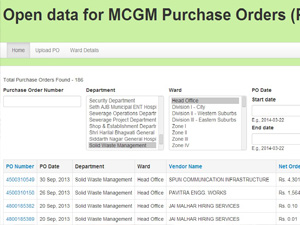
Ronak Sutaria, who is helping the Mumbai municipality proactively disclose information online, talks about how technology can help in social audits
The Right to Information Act, 2005, is a powerful tool available to citizens to ensure government transparency and accountability, and to know how public authorities spend their tax money. Section 4 of the Act focuses on proactive disclosure. This needs to be implemented by every public authority—data should be disclosed on a regular basis, and in an accessible manner. Citizens will then not need to request information formally, such through an RTI application. Unfortunately, very few public authorities have implemented this directive.
In the urban context, one of the things that citizens can conduct social audits of is specific contracts issued by the civic departments. To undertake such an audit, the citizen will need to collect all the information related to the contract issued, such as the tender document initially floated, the responses sent by the vendors to the tender, and finally the purchase orders issued by the government to the vendor. If sufficient information is not readily available on the department’s website, an RTI application can be filed. Once all the relevant information is collected, a field survey can be done, and citizens can conduct a social audit.
The public department or authority should provide all its public spending-related information easily and in a structured format. Ideally, it should be available in an Open Data format, that is data which is free or available at a negligible cost, accessible to all and easily shareable.
Organizations like the World Bank have been supporting Open Data standards and have been encouraging the implementation of transparency and openness in all government contracting work. Initiatives like Open Spending and Open Contracting, when implemented by public authorities, could greatly help with doing social audits on a city-wide scale by making data available to many people at one time using the internet.
Filing an RTI application to get information for social audits is very impactful at an individual level. However, hundreds of people sending RTI queries to public authorities for the same information is not so useful or sustainable in the long term. City-level public authorities like municipal corporations receive hundreds of RTI applications a day. For the Mumbai municipality, the number is 120,000 every year. So, proactive disclosure by such public authorities can enable larger segments of society to act on the same information in a timely manner and over a period of time. For this to happen, the implementation of Section 4 of the RTI Act by public authorities is imperative.
Ronak Sutaria works with a technology firm. He is also part of a team that is helping the RTI-Technical Advisory Committee of the Municipal Corporation of Greater Mumbai to build a social audit framework and an Open Data platform.